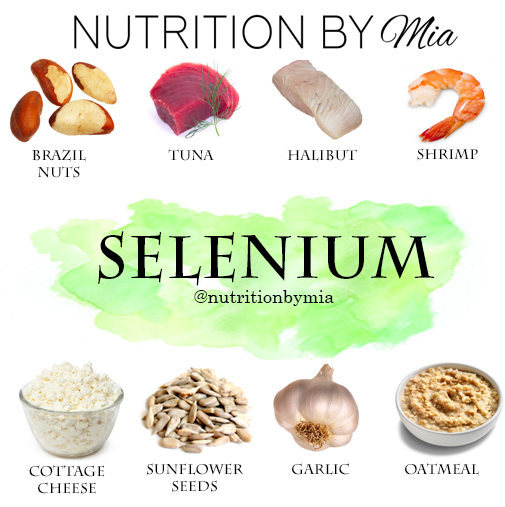
When I think of selenium I immediately think of “nature’s selenium supplement” otherwise known as Brazil Nuts. Only 1-2 per day meets your daily selenium requirement. Selenium is a trace element naturally present in foods and added to others. It is nutritionally essential and a key component of selanoproteins which play critical roles in thyroid hormone metabolism and protecting the cells from oxidative damage.
Selenium’s role in the body:
Defensive mechanism for oxidative stress: Selenium is intimately associated to glutathione peroxidase enzymes, which act to protect the body from oxidative damage by destroying free radicals. These enzymes are present throughout the body.
Regulation of thyroid hormone activity: Selenium is also associated with 5’-deiodinases, which are enzymes that activate and deactivate thyroid hormones. We know that thyroid hormones are responsible for regulating metabolism.
Medical Associations:
Abnormal selenium levels have been associated with cancer, cognitive decline, thyroid disease and cardiovascular disease. Therefore, ensuring adequate intake may be beneficial in avoiding these afflictions.
How much do we need?
The current RDA is 55 micrograms for adults aged 19 and older, 60 micrograms for pregnant women and 70 micrograms for lactating women. Intake should not exceed 400 micrograms per day. Too much selenium can lead to nausea, vomiting, hair loss and nail brittleness.
On average, men and women meet their daily selenium needs so it is not typically considered a nutrient of concern.
Sources:
Brazil nuts are the most potent source of selenium but it is also widely found in seafood and organ meats. Cereals, grains and dairy products are other sources. The amount of selenium in plant-based foods will depend on the amount of selenium in the soil which varies depending on geographical region. On the other hand, selenium levels in animal products are less variable. They maintain predictable tissue concentrations based on their homeostatic mechanisms.












